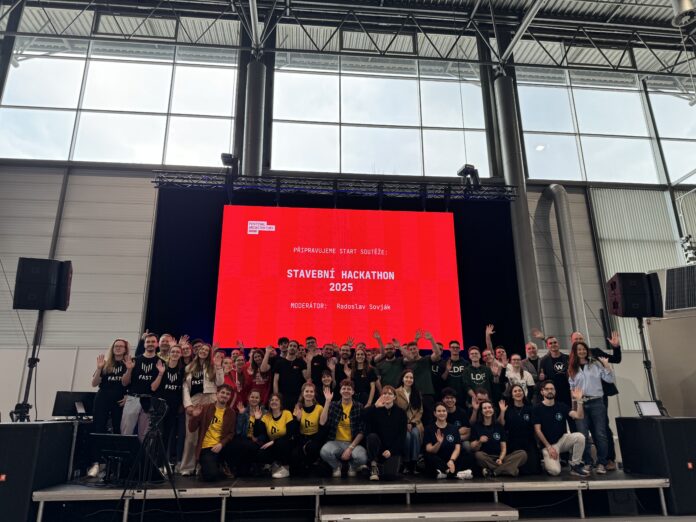Druhý ročník studentského Stavebního hackathonu, který proběhl na Stavebním veletrhu Brno a v rámci Festivalu architektury, rozšířil letos svůj záběr i za hranice Česka. Celá akce se konala pod taktovkou Národního centra Stavebnictví 4.0. K šesti českým technickým univerzitám – České vysoké učení technické v Praze, Vysoké učení technické v Brně, Vysoká škola báňská – Technická univerzita Ostrava, Mendelova univerzita v Brně, Česká zemědělská univerzita v Praze a Západočeská univerzita v Plzni – se letos připojila i Technická univerzita v Košicích, čímž soutěž získala mezinárodní rozměr. Studenti ve smíšených týmech hledali řešení modulárního a sériového bydlení, které je dostupné, technologicky pokročilé a udržitelné.
Zadání hackathonu oznámil během slavnostního zahájení ředitel Národního centra Stavebnictví 4.0 Radoslav Sovják, působící také jako profesor na Českém vysokém učení technickém v Praze, společně se zástupcem České komory autorizovaných inženýrů a techniků činných ve výstavbě Davidem Bečkovským. Studenti měli navrhovat bytový dům se čtyřmi až pěti podlažími, umístěný na konkrétním pozemku v intravilánu Moravského Krumlova.
Druhý ročník hackathonu přinesl několik zásadních novinek. Studenti dostali dvojnásobný čas na přípravu svých návrhů a jejich zadání bylo konkretizováno umístěním bytového domu právě v Moravském Krumlově. Důležitým prvkem bylo propojení studentů s mentory z různých odvětví stavebnictví – od ocelových a betonových konstrukcí přes zdící technologie až po dřevostavby. Hodnocení projektů se soustředilo na pět klíčových aspektů: splnění zadání, konstrukční řešení, estetiku a architekturu, dostupnost bydlení a inovativnost.
Na pódiu se představili také mentoři všech sedmi soutěžních týmů – odborníci z firem specializovaných na různé konstrukční a materiálové technologie, od oceli a betonu přes cihly až po dřevostavby. Osmý, průřezový mentor zastupující developerskou oblast shrnul klíčové kroky k zajištění dostupnějšího bydlení. Zdůraznil nutnost digitalizace a odbyrokratizování povolovacích procesů, zmírnění přeregulovanosti, urychlení územního plánování a podporu výstavby dostupného nájemního bydlení.
Druhý ročník Stavebního hackathonu má za cíl nejen inspirovat k řešení specifických výzev českého stavebnictví, ale také podpořit inovativní technologické přístupy. Soutěžní projekty byly hodnoceny podle pěti hlavních kritérií: zvoleného konceptu a dodržení zadání, konstrukčního řešení, estetiky a architektury, dostupnosti bydlení a inovativnosti.
„Práce všech univerzitních týmů předčily očekávání a výborně se propojily s naší expozicí modulární bytové výstavby, kterou jsme připravili na stavebním veletrhu v rámci našeho projektu Obec ON,“ uvedl Daniel Ryšávka, ředitel Státního fondu podpory investic (SFPI), a dodal: „Novým systémem financování a poradenské podpory dostupného nájemního bydlení jsme nastartovali změnu, jejíž součástí se dnešním dnem stali i všichni mladí účastníci Stavebního hackathonu. Kolegové od nás ze SFPI, kteří se na soutěži podíleli v roli mentorů nebo výběru konkrétních projektových záměrů obcí, prožili tři dny plné tvůrčí energie se studenty a technologickými partnery. Věřím, že členové studentských týmů se budou na zlepšování dostupnosti bydlení podílet jako budoucí projektanti i nadále.“
Účastníky přivítal také obchodní ředitel společnosti Veletrhy Brno Lukáš Helan, který zdůraznil význam veletrhů nejen jako platformy pro prezentaci exponátů, ale také jako místa setkávání firem, odborníků a vizionářů, kteří posouvají stavebnictví do budoucnosti. Zároveň ocenil studenty za jejich inovativní myšlení a schopnost přinášet nové pohledy na řešení současných výzev.
„V letošním ročníku studentského Hackathonu nás překvapily nadstandardní výkony od všech studentů, kteří prokázali ohromnou kreativitu, dovednosti a týmovou spolupráci. Rádi bychom vyzdvihli schopnost skvěle a okamžitě aplikovat poznatky z konzultací s odbornými mentory do svých vizí a návrhů a pozitivní přístup k řešení zadaného úkolu v tomto krátkém čase. Výběr nejlepšího týmu byl velmi těžký, protože si všichni zasloužili ocenit za svou snahu. Těšíme se na další podporu mladých studentů.“ – Jiří Štěpka, technický ředitel CENTRAL GROUP.
„Překvapila mě aktivita studentů i to, jak se byli schopni poprat se zadáním, které počítalo s vysokou mírou udržitelnosti, ale zároveň s tím, že se má jednat o finančně dostupnou stavbu. Přemýšleli kvůli tomu nad různými typy vytápění a úsporných opatření. Museli přitom zohlednit, že nějaké podmínky máme dnes, ale doba se bude posunovat a něco jiného bude výhodné za pár let. Bylo také zajímavé sledovat, jak přijde studentům automatické, že budova má mít fotovoltaiku nebo kus zeleně. To je něco, co by se nám jako společnosti velmi hodilo už dnes,“ uvedl technický ředitel energetické konzultační společnosti PKV Jiří Španihel.
Studentské týmy přišla podpořit i zastupitelka města Brna Anna Putnová a odborný garant Festivalu architektury Petr Selník. Manažer komunikace Státního fondu podpory investic Petr Ondrášek vysoce ocenil zaměření hackathonu, přičemž upozornil, že nedostatečná nabídka dostupného bydlení představuje klíčový problém nejen České republiky.
„Pozorovat zápal studentů při navrhování i prezentaci konkrétního projektu dostupného nájemního bydlení bylo skvělé. Budou to právě oni, kdo budou tvořit naši budoucnost bydlení. Práce poroty nebyla nakonec vůbec jednoduchá i proto, že jsme museli oddělit výstupy týmů od výhod i nevýhod jednotlivých modulárních systémů, které dostaly přidělené. Mě oslovilo u vítězného projektu především využití pavlačí pro potkávání komunity, zeleně a zakomponování do lokality.“ – Barbora Špicarová Stašková, náměstkyně ministra pro místní rozvoj.
Akci Stavební hackathon zaštítilo Ministerstvo pro místní rozvoj, které udělovalo ocenění za development, a Ministerstvo průmyslu a obchodu, jež předalo ocenění za stavební průmysl.
Hlavní cenu starostů OBEC ON získala Mendelova univerzita v Brně, kde porota ocenila, že návrh originálně pracuje se systémem pavlačí, který rozvíjí komunitní život, a tvůrci zároveň úspěšně navázali na identitu města. Ocenění za development si odnesl tým z Vysokého učení technického v Brně, kde porota ocenila schopnost studentů využít maximálně potenciál přiděleného konstrukčního systému. Ocenění za stavební průmysl putovalo na Vysokou školu báňskou – Technickou univerzitu v Ostravě, kde porota ocenila práci týmu s funkcionalitou systému, který jim byl přidělen, včetně přístupu k udržitelnosti a zhodnocení životního cyklu stavby.



